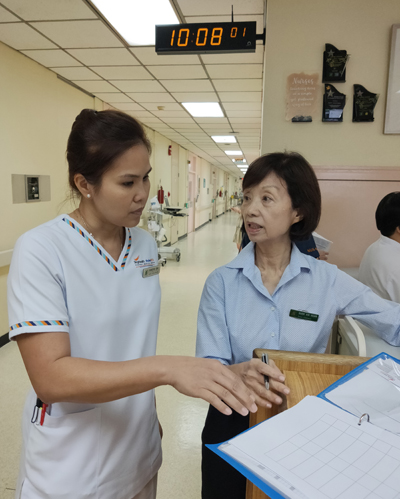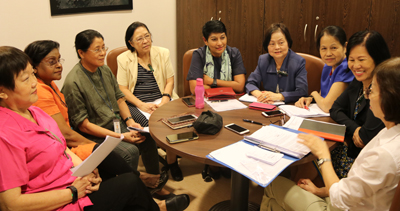We tagged along with Quek Aik Huan to learn more about what they do, and how they helped stopped over 800 feedback from progressing to complaints
Complaints often start as an enquiry or a simple concern. However, when left unanswered, it could escalate into a formally lodged complaint that requires more resources to manage. To mitigate such occurrences, we introduced a ground up approach to address concerns on the ground early and in a timely manner.
Since July 2018, a pioneering group of nine former Senior Nurse Manager Mentors have taken on a new role – one aimed to address patient and caregiver feedback upfront during their admission and outpatient visits with us and to nip potential issues in the bud. With over 450 years of experience collectively, the wealth of their knowledge and close working relationships with clinical leaders has stopped over 800* feedback from becoming complaints.
We tagged along with Senior Patient Experience Manager Quek Aik Huan to learn more about what they do, and how they are helping to improve patient experience.
8am – 12pm
Aik Huan starts her day by reviewing feedback from the six wards under her charge. There are some cases from the day before to follow up and a few key patients she will need to check in on. She also checks our inpatient Citrix system to see if the nurses have made notes on patient or caregiver feedback raised during the night before heading out to walk the ground till noon when she breaks for lunch.

SNM Dorothy Ong (left) of Ward 57 says, “I look forward to SPEM Quek’s visits. She is very experienced and generously guides on how we can address patients’ and caregivers’ concerns and feedback.”
What are the most common types of feedback we receive?
The common types of feedback we receive during our daily patient engagements are
- The air conditioning in the newly renovated B2 wards is too cold
- Taste of the food served
- The length of time nurses take to respond to call bells
- Noise at night which disturbs their sleep
- Not receiving timely updates on their care management
Gaps in communication with patients and caregivers have been known to result in unhappiness. For example, caregivers often want to receive updates directly from the clinicians or consultant in-charge who may not be around during the ward rounds which typically occur outside of visiting hours. So our nurses will act as the intermediary but there are times when we will need time to hear back from the care team before being able to update the family members.
What is the most difficult feedback you have had to manage? How did you cope with it?
I feel it is important to remain calm, especially in the face of aggression and to keep an open mind. Really listen to the feedback in order to determine the real reason behind the unhappiness. There are always things we can improve on.
One that stands out is from the son of a patient. During his daily visits, he would berate the ward nurses for what he perceived as a lack of knowledge in managing his father's condition and bad attitude. He posted a photo of one of the nurses on his Facebook account, criticizing her attitude and manner. The nurse was clarifying the clinical updates he wanted to know.
The ward supervisor and I met up with him to see how best we could address his concerns. Throughout the session, he insisted that his experience being in the service line meant he knew our nurses were performing inadequate patient care and that they were doing everything wrong. I nodded in acknowledgement. I did not retaliate as that would come across as being defensive. When his father was transferred to the Intensive Care Unit, it was the same and the nurses were distressed and felt threatened. The Assistant Director, Nursing met up with him to mediate.
What do you enjoy most about this new role? And what have you found to be the most challenging?
This role gives me many opportunities to communicate with different groups of medical and surgical patients with various conditions. I am happy to be on this learning journey as it has greatly enhanced my knowledge on diagnosis and treatment plans.
The most challenging aspect is managing the emotions of an angry patient or caregiver. But being able to 'convert' them to one who leaves the hospital with appreciation and gratitude is also highly satisfying. The secret is to visit them daily, build rapport and ensure that their care is not compromised.
SNM Sharon Lee of Ward 47 said, "She is a great resource particularly in helping younger nurses manage feedback. Her calm and reassuring demeanor puts patients and caregivers at ease and they are more inclined to open up to her, allowing us to get to the root cause of their feedback."
1pm – 3pm
Ward rounds resume after lunch as there are many areas to cover.
"Sometimes, I get calls from the nurses in charge for new cases which I will try to attend to as soon as I can. Besides listening and looking out for patients, we also need to look after the caregivers, and at times, act as mediators between family members. Relationships are complex and being ill adds stress that can increase tension between family members", said Aik Huan.
Aik Huan heads back to her office at SGH Blk 7 at 3pm but her day has not ended. She updates the day's cases in the inpatient system, which becomes reference for follow up the next day.
4pm – 6pm
Debrief with Karen Perera, Deputy Director, OPE, and the other SPEM members where they share the day's more challenging cases to learn from each other before calling it a day.

What advice would you give to colleagues facing difficult patients and caregivers?
My 3 tips
1. Provide a listening ear - Allow the anxious and demanding (at times) patient or caregiver to 'ventilate'. Always speak to them in a soft and courteous tone. Explain and if need be, apologise sincerely.
2. Build rapport and perform service recovery - On my first day meeting with the SNMs of the wards, my key message to them is to build rapport with patients and their family members. During their morning rounds, to spend 5 -10 minutes talking with them and nip any negative feedback in the bud. When necessary, speak with the nursing team and inform them of the feedback and provide service recovery. Throughout it all, be tactful. Inform the medical team regarding the feedback so that they can help to manage the feedback as well.
3. Make yourself accessible - I will tell the SNM/NC to give patients and caregivers permission to contact them either through calling the ward or directly through the nurses if there is any issue. Some situations may require someone more senior or experienced to manage.
In addition to the ward rounds, each Senior Patient Experience Manager takes turns to man the Service Quality feedback hotline every Thursday. Aik Huan also conducts monthly case sharing sessions where she shares difficult cases with the nursing staff of wards under her charge. This is an interactive session where they discuss how each case could have been better managed.
On having her role redesigned, Aik Huan has this to say, "Change is inevitable if we want to progress. Keep an open mind and accept that there is always something new to be learnt, and new areas where our knowledge and experience can better benefit our patients."
*As at July 2019
We love mail! Drop us a note at [email protected] to tell us what you like or didn't like about this story, and what you would like to see more of in LighterNotes.
